- Home
- Gordon Korman
A Semester in the Life of a Garbage Bag
A Semester in the Life of a Garbage Bag Read online
For anyone who has ever turned his eyes skyward in grievous complaint.
And for Jean Feiwel and Brenda Bowen, who made sure I didn’t have to.
Table of Contents
Cover
Title Page
Dedication
One
Two
Three
Four
Five
Six
Seven
Eight
Nine
Ten
Eleven
Twelve
Epilogue
About the Author
Other books by Gordon Korman
Copyright
One
Although Sean Delancey had not yet met Raymond Jardine, Raymond had been scouting him for some weeks now. Raymond, new to the school, was in Sean’s English class, but their first official meeting didn’t come until Mr. Kerr designated them partners for the semester’s major project.
“Modern poetry is the true reflection of twentieth-century society,” Mr. Kerr announced to the students, who were certain it was not. “When we study modern poetry, we are really, in a way, studying ourselves.”
Raymond looked Sean squarely in the eye. “Delancey, S., student number 5112, junior, height: 5′ 11″, weight: 160 pounds, hair: blond, eyes: blue, grade point average: 3.2. Extracurricular activities: varsity basketball.”
Sean looked from Raymond to Mr. Kerr and back to Raymond again. “Huh?”
Raymond produced a sheet of paper from his English book. “On September nineteenth, you signed up for the Nassau County high school program in Greece next summer. Eight weeks on Theamelpos, the most beautiful island in the Aegean.”
“So?”
“So, that’s my trip — Jardine’s only alternative to another summer working in my uncle’s fish gutting plant in Secaucus. Think about it. A paradise in the Aegean versus fish guts in New Jersey. Now do you understand?”
“This project will make up sixty percent of your final grade,” proclaimed Mr. Kerr genially.
Sean’s head was spinning. “Wait a minute! What’s with you? You think they’re taking only one guy to Theamelpos?”
“Maximum six per school,” Raymond retorted. “Listen, I was the first guy to sign up for this trip. I destroyed all the notices telling about the program. They put up new notices, and I tore them down every time. I even stole the poster of Theamelpos from the travel agent in the mall. I don’t know how you found out about it.”
“My mother teaches in Massapequa,” Sean admitted almost apologetically.
Raymond looked up to the ceiling. “His mother teaches in Massapequa,” he repeated. “Nice. So that’s why, on September nineteenth, Jardine came to school in a perfectly good mood to find that Delancey, S., had signed up for my trip. And you obviously have a big mouth, because by the end of the day, there were three more names on that list. Now there are seven of us, and maybe more on the way, going for those six spots, thanks to Delancey, S., and his mother in Massapequa. Those aren’t good odds when you’ve got an uncle in the fish business.”
Sean wasn’t sure if he should chew Raymond out or say, “I’m sorry.” “Listen. We’re missing the assignment! Did he just say something about footnotes?”
“The bottom line is competition,” Raymond went on, as though Sean had not spoken. “I didn’t ask for it, but I’ve got it. That’s why I keep complete files on every name on that sign-up sheet. I want to know exactly what I’m up against.” He glanced at the paper in front of him. “This is a really bad picture of you. Did you have the mumps or something?”
Sean could bear it no longer. “What’s your problem, huh? How can you take a summer trip that’s supposed to be fun and turn it into a life-and-death strategy war?”
“Because I have to try twice as hard as everyone else,” Raymond said readily. “You see, I have no luck — none at all, zero, zip, zilch — and as soon as I saw that seventh name go up on the list, I knew my back was against the wall because, given half a chance, the heavens will open up and dump crud all over Jardine.”
“What good are those files going to do you? If they don’t pick you for the trip, all the spying in the world won’t help.”
“Ah, yes. But these records are the equivalent of what the staff will look at when they’re making the selection.” He began to riffle through the sheets. “For example, grades. The only one of us running a D average in one of his courses is — let’s see — Jardine in — uh — English.” He looked disgusted. “And I just got for a partner the guy who started the run on Theamelpos in the first place. He gets great grades across the board, except for — get this — English, which won’t hurt him, but will probably be enough to bury Jardine.”
Mr. Kerr was finishing up his list of instructions. “The due date will be the end of the semester. No late papers accepted. Any questions?”
“How long should the finished project be?” asked a girl in the front row.
“At least twenty-five to thirty pages,” the teacher replied. “Typed, of course.”
“Do you at least type?” Raymond asked Sean.
“Three-and-a-half words a minute,” Sean replied defiantly.
Once again, Raymond looked at the ceiling. “He doesn’t type.”
***
Q. David Hyatt was looking at the school. This was nothing unusual. Each day he would stop his new Cadillac at the edge of the school property and spend a pleasant ten or fifteen minutes just looking.
Actually, DeWitt High was a not-very-new, squalid-looking red brick building. The only thing that made it different from any school anywhere was that the Department of Energy had selected DeWitt as the field-test site for the Solar/Air Current Generating System, or SACGEN.
Hyatt’s eyes traveled to the apparatus on the roof, a large and complicated affair that looked like nothing more than a battered hat surrounded by cylinders, squares, oblongs, and half circles, all of dull metal and glass. True, it was ugly, but to Hyatt it was the ninth wonder of the world, the eighth being the fact that he was principal of the school selected to be host to such a masterpiece. His chest swelled with pride.
An anonymous letter, probably from one of the students, had arrived at his house the day before, saying that SACGEN looked as if a giant garbage truck had parked in the sky over DeWitt High and dumped its load on the roof of the school. What appalling ignorance! SACGEN, with its solar energy panels and wind collectors, was powering the entire building from nothing more than the sun and air currents of southern Long Island. No wonder he had rushed right out to the Cadillac dealer as soon as they had begun construction. No wonder he had spent the hundred dollars to have his licence plates changed to SACGEN. The principal of the school entrusted with the only working SACGEN in the world had an image to maintain.
Parking the car, Mr. Hyatt walked along the driveway to the school’s front entrance. Once again, he paused. He felt a certain warm tingle every time he saw the light on in the foyer. This was coming from the sun and the wind, not from any electric company.
Suddenly the foyer lights went out, along with every other light in the building. The loving smile on the principal’s face disappeared as quickly as if he, too, had been hooked up to SACGEN.
Oh, well. Revolutionary new inventions always had a few bugs to iron out at the last minute. No problem.
***
“The SACGEN system is working perfectly. This is only a test,” the public address system had announced just before the entire school was plunged into darkness.
There was a loud chorus of boos, hisses, and jeers in English class and every other room in the school. It had taken the students at DeWitt only three or four days to
figure out what the entire Department of Energy and Q. David Hyatt refused to accept — SACGEN didn’t work. Oh, yes, the solar panels collected, and the wind rotors turned, and it did power the school. But it broke down constantly, wreaking havoc on the building’s electrical system. SACGEN itself, apparently, had never been shown the schematic diagrams that proved beyond a shadow of a doubt that it worked perfectly. It insisted on being a thirty-three-million-dollar lemon.
“We’re in the dark again,” observed Mr. Kerr’s voice from the front of the room. “I don’t suppose anyone would be interested in continuing by flashlight.”
His response was a sympathetic murmur.
A strange sound drew Sean’s attention back to Raymond. He squinted in amazement. His new partner was drumming out ancient tribal rhythms on his desk. As if this weren’t enough, he was intoning a low ritual chant in a made-up nonsense language, the only recognizable word of which was “Theamelpos.” It kept coming up every second sentence or so, whined out in a strange accent.
The sound of a textbook slamming shut signified that Mr. Kerr had had enough. “Forget it,” the teacher announced. “We’ll try again tomorrow.”
The halls were brighter, because of the large school windows, and Sean mingled with students from other classes, which were gradually being let out as teacher after teacher threw in the towel to the “test.” His plan was to put as much distance as humanly possible between himself and Raymond Jardine.
“There he is!” Randy Fowler jogged up, Chris McDermott in tow. “The man, the myth, the legend, the star!”
Chris began running in circles, moving his hand as though dribbling a basketball. “Five seconds left, they get the ball to Delancey, four — three, he puts it up, two — one, it’s in! Sean Delancey has won the game on a beautiful twenty-foot shot!”
Sean smiled modestly. “It was only eighteen feet.”
“In that case,” said Chris, “I take back my congratulations.”
The halls were buzzing with the news of last night’s basketball game with Freeport High. Sean had played his usual strong game, capping the performance with a game-winning basket just as the last second died.
Playing the hero was greatly improving Sean’s spirits. This was what high school was all about — not getting forced into stupid English projects with Raymond Jardine! Pausing to shake a few more hands, he idly hoped that Mindy O’Toole, his ex-girlfriend, knew about the game. Three days earlier, Mindy had dumped him because their relationship was fading, whatever that meant.
“Hi.”
Sean wheeled to find his younger sister, Nikki, hurrying to join him.
“What’s going on, Sean? You didn’t tell me there was going to be a SACGEN test today.” Nikki was a freshman, and seemed to think upperclassmen were informed about such issues as SACGEN tests. “I killed Mom’s quilted pot holder. The sewing machines all went apewire.”
Sean didn’t feel like talking to her. There were still a lot of people around who hadn’t congratulated him yet. “I’m a junior, Nik. When they need permission for a SACGEN test, they go to the seniors. We’re only consulted on public executions and acid rain. Besides, that wasn’t any test. The windmill died like it always does.”
“Aw, come on, Sean. I’m serious. That was going to be Mom’s Christmas present. Now it won’t be ready until Mother’s Day.”
“Well, if you really step up production, and the windmill behaves itself, you might be able to give it to her for Groundhog Day.”
“It’s not funny, you know, Sean! Sean?”
Her brother was not paying attention. In the rapidly filling hallway, he had caught sight of Raymond in a sheltered alcove, lying flat on his back, staring up into his files, shuffling pages and studying intently.
“Probably plotting who has to die so he can go to Theamelpos,” Sean muttered through clenched teeth.
His sister looked at him quizzically. “What?”
“Nothing. Let’s go grab a soda or something.”
Nikki nudged his arm. “Hey, Sean, there’s someone waving at you.”
Sean turned and followed her gaze until his eyes fell on Raymond, who had put down his notes and was beckoning and grinning.
“Who’s that?” she asked.
Sean turned away quickly. “Nobody.”
“But why is he waving at you?”
“He must be looking for somebody else.” His brow knit. Why was Raymond smiling at him? At Sean, whom he had just accused of putting Theamelpos in jeopardy? Weird!
As they headed for the cafeteria, Nikki was still looking back at where Raymond lay, once again absorbed in his notes. “Are you sure you don’t know him? I’m almost positive he was waving at you.”
“Give me a break, Nik!”
***
Sean left school on the run that day, darting for the bus stop at top speed. He had come back from computer class to find a note taped to the door of his locker: Catch you later. Jardine. The mere thought of spending more time with Raymond than absolutely necessary had given his feet wings. But even this was not enough to put him on the early bus, which pulled out, leaving him standing there fuming. His computer teacher, Mr. Lai, waved at him from his seat at the back window.
Frowning, he began to saunter back toward the school building, intent on buying a Coke to pass the twenty-minute wait between buses. The local transit stank, but it was better than waiting for the school bus for two reasons: first, he’d have to hang out with Nikki and her obnoxious friends as they talked their brains out, trying to get in those last few opinions before they could get home and phone each other; second, he’d stand an increased chance of running into Raymond Jardine, a meeting much to be avoided. As he walked, he came across a battered ancient Honda motor scooter leaning against the school’s chain-link fence. The red paint was so badly pockmarked with rust that Sean had to squint to make out the name scratched into the mudguard — JARDINE. Sean wheeled in his tracks and headed back to the bus stop. From nine o’clock to ten minutes of ten every day until Christmas, he was going to be faced with Raymond. The rest of his life was going to be Jardine-free time.
***
Dinner at the Delancey house was an event unmatched anywhere else in the world, Sean reflected as he toyed with his veal cutlet. It had been this way ever since Gramp had come to live with them two months before. Gramp was Mr. Delancey’s father, a spry eighty-eight, and had been dragged under protest from his beloved old apartment in Brooklyn because he was “too old” to live by himself. Sean knew that if liveliness was any indication, Gramp was the youngest person in the household.
“So, Pop,” said Mr. Delancey conversationally, “what did you do with yourself today?”
Gramp chewed thoughtfully. “Well, let me see. The President needed some advice on foreign policy, so I was on the phone most of the morning. And Marilyn Monroe dropped over for lunch. Then Babe Ruth and I took a little batting in the backyard. After that, I climbed Mount Everest, swam the English Channel, and came back by pogo stick through the Adirondacks just in time to whip up a cure for the common cold right here in your kitchen.” He paused. “On second thought, that must have been somebody else. I sat around all day and listened to the grass grow.”
Sean’s mother tried to chuckle. “Aw, come on, Pop. Where would you be if not with us?”
“In Brooklyn,” the old man said stoutly, “where I belong. I don’t like grass. You never know where you stand with grass. I’ll take a good sidewalk any day.”
“A broken-down old building in a neighborhood teeming with street gangs and hoods,” said Mrs. Delancey derisively.
“Lovely boys,” her father-in-law corrected her. “They were like my own children.” He glared at his son. “Better, even. Who do you think painted my apartment, and shopped for me when I was laid up with gout? And bright, too. If I ever got locked out of the house, or lost my car keys, they could get inside in a snap.”
Mr. Delancey rolled his eyes. “Now, Pop, you know your building was being torn down.�
�
The old man shook his head. “I guess when you’ve been on Long Island for a few years, you forget little details like the fact that there’s more than one apartment building in Brooklyn.”
Nikki looked into her plate. “Why are the potatoes black?”
“Don’t blame me,” her father said quickly. “Blame Mr. Schnitzenberger next door.”
“Why?”
“He illegally gained access to the house, snuck into the kitchen, and set fire to our potatoes,” said Gramp seriously.
“Come on, Pop,” said Mr. Delancey. “It was the wireless remote radio-activated oven control we bought last week, Nik. You know — so Mom can set up the oven in the morning and turn it on from anywhere within forty-six miles of the house.”
“What happened?” Sean asked.
“Mr. Schnitzenberger’s garage door opener works on the same frequency,” Mrs. Delancey explained. “The potatoes cooked for over seven hours.”
“The nerve of that guy!” Gramp exclaimed, pounding on the table in anger. “Ten years ago, when he bought his garage door opener, he should have predicted this! Some neighbor!”
“Pop, please,” said Mrs. Delancey.
“Mom’s home by four o’clock anyway,” Sean pointed out. “Why do we need remote control?”
“We live in an age where everyday people can be pioneers!” said Mr. Delancey grandly, launching into his usual speech explaining why he and his wife poured their money into every new invention on the market. “Think of the technological advancements that are made every year! In this modem era …”
Mentally, Sean tuned him out. It was a great speech, but it sounded too much like Q. David Hyatt haranguing the students on the wonders of SACGEN. Besides, it was hard for Sean to be inspired when the images of past examples of the “modern era” were still fresh in his mind. It had only been two weeks since his mother’s revolutionary new iron had burned through his pants, the ironing board, the floor, and most of the asbestos casing on the furnace in the basement. Before that had come the robotized light-bulb changer, which had covered the floor with so much broken glass that Mr. Delancey had been forced to call into service the turbo-charged vacuum cleaner to suck up the glass along with half of the house, including fifteen hundred dollars worth of wall-to-wall broadloom. But the pièce de résistance had come last year with the extreme voltage air purification modulator. Sean could still remember the humiliation he’d endured when the device had belched out an enormous toxic blue cloud over the Delancey house.

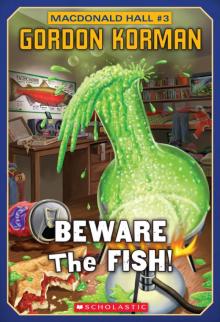 Beware the Fisj
Beware the Fisj Slacker
Slacker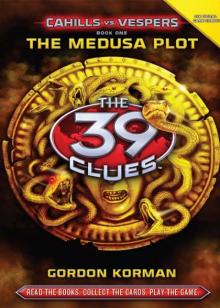 The Medusa Plot
The Medusa Plot This Can't Be Happening at MacDonald Hall!
This Can't Be Happening at MacDonald Hall! The War With Mr. Wizzle
The War With Mr. Wizzle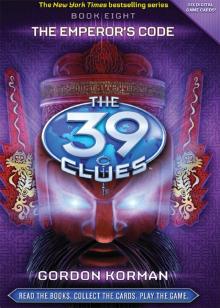 The Emperor's Code
The Emperor's Code Zoobreak
Zoobreak The Danger
The Danger Unsinkable
Unsinkable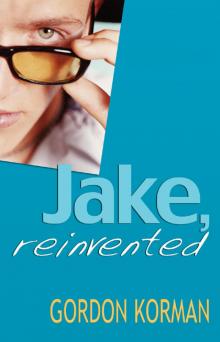 Jake, Reinvented
Jake, Reinvented No More Dead Dogs
No More Dead Dogs The Stowaway Solution
The Stowaway Solution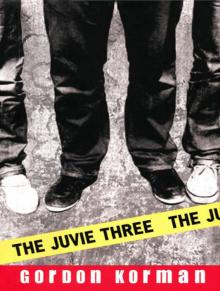 The Juvie Three
The Juvie Three The Climb
The Climb Criminal Destiny
Criminal Destiny Hideout: The First Adventure
Hideout: The First Adventure Flashpoint
Flashpoint Swindle
Swindle Pop
Pop The Rescue
The Rescue Memory Maze
Memory Maze The Sixth Grade Nickname Game
The Sixth Grade Nickname Game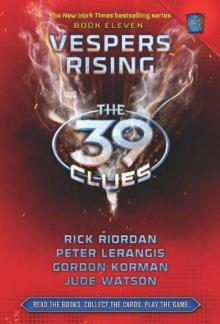 Vespers Rising
Vespers Rising Collision Course
Collision Course The Abduction
The Abduction Losing Joe's Place
Losing Joe's Place The Dragonfly Effect
The Dragonfly Effect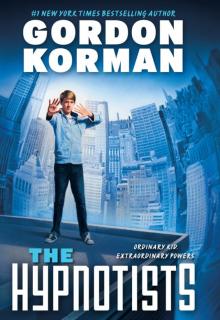 The Hypnotists
The Hypnotists Survival
Survival Lights, Camera, DISASTER!
Lights, Camera, DISASTER! Payback
Payback Ungifted
Ungifted Unplugged
Unplugged Framed
Framed Supergifted
Supergifted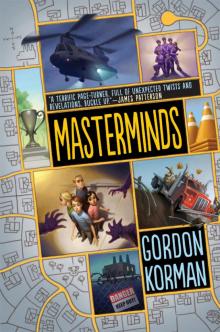 Masterminds
Masterminds Jackpot
Jackpot Don't Care High
Don't Care High The Deep
The Deep Go Jump in the Pool!
Go Jump in the Pool! The Contest
The Contest Public Enemies
Public Enemies Hideout: The Second Adventure
Hideout: The Second Adventure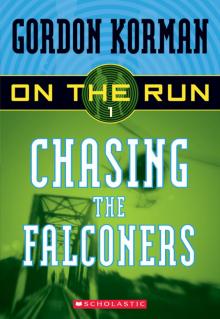 Chasing the Falconers
Chasing the Falconers One False Note
One False Note Shipwreck
Shipwreck Jingle
Jingle Unleashed
Unleashed Son of the Mob
Son of the Mob Now You See Them, Now You Don't
Now You See Them, Now You Don't War Stories
War Stories Schooled
Schooled Hunting the Hunter
Hunting the Hunter The Zucchini Warriors
The Zucchini Warriors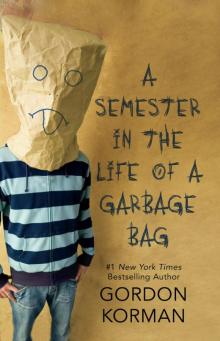 A Semester in the Life of a Garbage Bag
A Semester in the Life of a Garbage Bag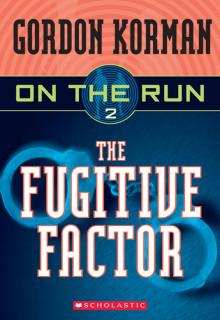 The Fugitive Factor
The Fugitive Factor Born to Rock
Born to Rock The Summit
The Summit Showoff
Showoff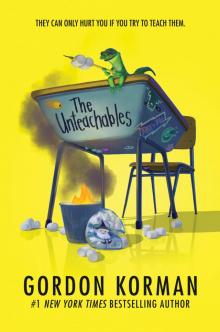 The Unteachables
The Unteachables The Third Adventure
The Third Adventure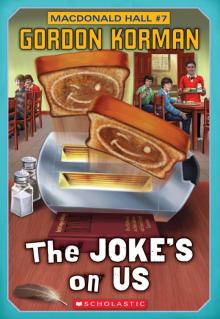 The Joke's on Us
The Joke's on Us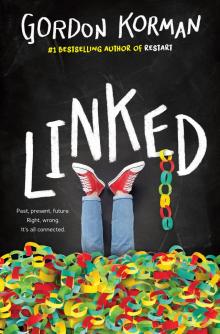 Linked
Linked The Wizzle War
The Wizzle War The 6th Grade Nickname Game
The 6th Grade Nickname Game The Second Adventure
The Second Adventure The First Adventure
The First Adventure![39 Clues : Cahills vs. Vespers [01] The Medusa Plot Read online](http://i1.bookreadfree.com/i2/04/10/39_clues_cahills_vs_vespers_01_the_medusa_plot_preview.jpg) 39 Clues : Cahills vs. Vespers [01] The Medusa Plot
39 Clues : Cahills vs. Vespers [01] The Medusa Plot